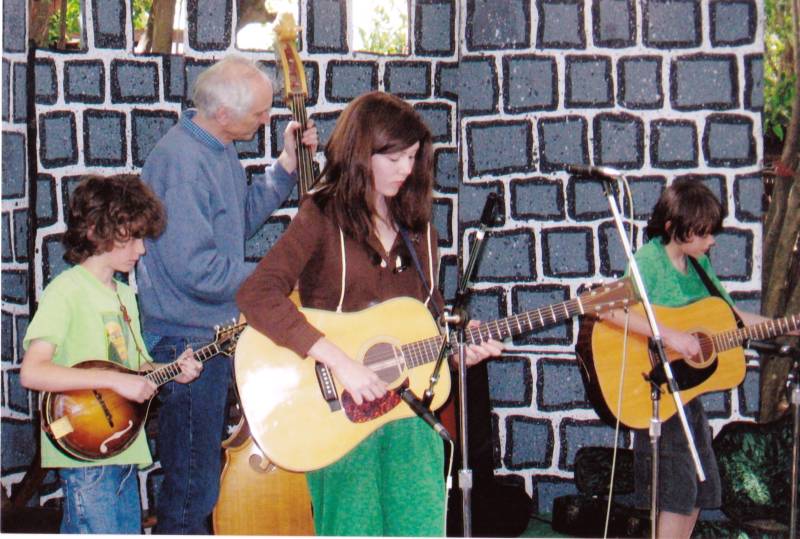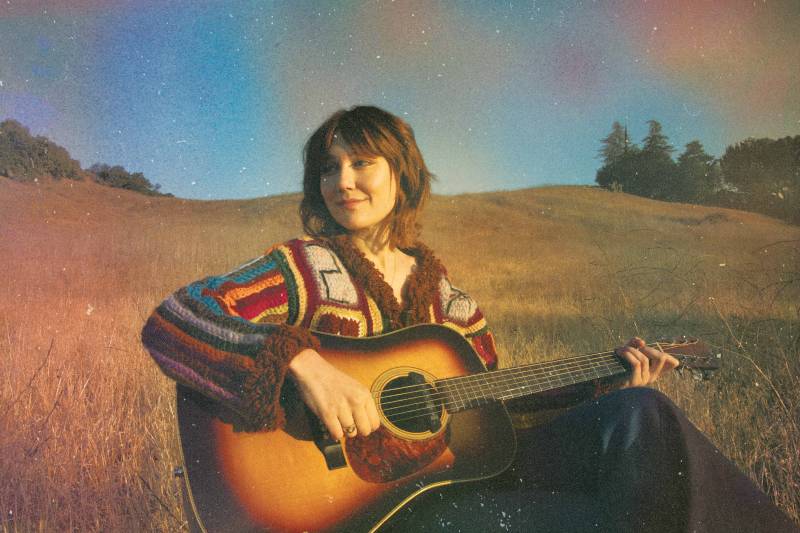Singer and guitarist Molly Tuttle has been lighting up the bluegrass music scene with her third album, Crooked Tree — and she’s got two Grammy nominations this year to prove it. One is for Best Bluegrass Album and one is for the coveted Best New Artist award — making her the first bluegrass artist to be nominated in the latter category.
“It just wasn’t on my radar of even being a possibility,” Tuttle says of the Best New Artist nomination. “So when I saw that, it just blew me away. I was kind of in disbelief for a few days.”
Tuttle, who grew up in Palo Alto and now lives in Nashville, is no stranger to awards, though. She’s a two-time winner of the International Bluegrass Music Association’s Guitar Player of the Year award — the first woman to win the title. In 2022, she was named Female Vocalist of the Year by the same organization.
It’s recognition that affirms what her father Jack Tuttle, a Palo Alto-based bluegrass musician and music teacher, sees as her triple-threat talent.
“Molly can play very intricate, complex lines that are very fluid. Kind of smoother, cleaner than your typical bluegrass guitar player,” Tuttle says. “She’s got that package now of high-level guitar playing, great singer and a really good songwriter.”
Molly Tuttle knew by high school that she wanted music to be her path. She’d been playing at bluegrass jams since she was 11, plus festival gigs alongside her father and two brothers in the family band, The Tuttles.
“When I had other friends talk about colleges and what they wanted to do after graduating, it dawned on me that like, all I really want to do is play music,” Tuttle says. “And that’s what I’m doing every chance I get. Every weekend I’m trying to play shows and I get home and want to practice guitar.”

She first honed her songwriting skills by taking classes at Foothill Community College in Los Altos Hills during her last two years of high school. She then set off to Berklee College of Music in Boston, where she studied in their Americana Roots program.
At the start of her career, though, Tuttle didn’t want to be pigeonholed as a bluegrass artist.
“I felt like I had all this other music that I loved to listen to and that I loved to write,” Tuttle says. “So my first two records were kind of a departure from the music I grew up with and that felt really natural to me.”
Then the pandemic hit. Between sheltering in place and the shutdown of music venues and festivals, Tuttle realized how much she missed the bluegrass community.
“Bluegrass music is so cool because you go to a festival and you see all your friends. And you might see people who are up on the stage and at night they’re in the campsite jamming. It’s really communal music,” Tuttle says.
Now, with the success of Crooked Tree, Tuttle’s headlining some of the big festivals she grew up watching her music heroes play.
“I feel like I’ve reached so many of those early dreams that I had as a kid,” Tuttle reflects. “It feels really cool. Like this year we’re going to headline the Father’s Day Bluegrass Festival, which I grew up going to in Grass Valley.”
That festival inspired the song “Grass Valley” on her Grammy-nominated album. It features her father on backing vocals and came out of a yearning for togetherness during the height of the pandemic.
“When we were no longer able to gather, something about that triggered this kind of feeling in me. Like, I want to make these songs that people can jam on in the campsites and play with their friends,” Tuttle says. “It’s probably the most autobiographical song on the record. I just wanted to pay tribute to where it all started for me.”
Another song on her album also conjures memories of home, albeit bittersweet ones. Titled “San Francisco Blues,” the song laments the impacts of gentrification in the Bay Area.
“It’s sort of a personal song. That disconnect between, like, I go back and all my favorite spots are disappearing and the vibe seems different from when I used to go into the city as a kid,” Tuttle says.
It’s also a nod to people who have been pushed out of the Bay Area due to the high cost of living, something she relates to as a musician. Despite being regularly homesick for California, she says, “it definitely makes more sense to live here in Nashville, where it’s more affordable.”
Right now, though, those blues are taking a backseat to the pride that Molly Tuttle, her family and local fans are feeling as her star rises, including the Grammy nod.
“You can see the pride in all the people in the bluegrass community. She’s like the home state gal that’s making it big,” says Jack Tuttle.
And Molly Tuttle says she’s taking that support with her into Grammy night: “I definitely feel the Bay Area music scene rooting for me, which is cool.”


